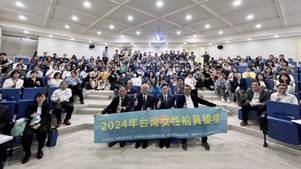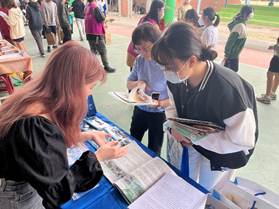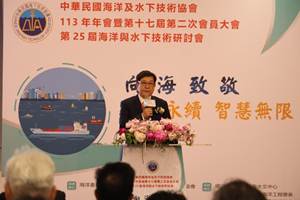17.2.2
- 2024 Taiwan Women Seafarers Forum 2024年臺灣女性船員論壇
The "Women Seafarers Forum" aims to recognize the outstanding contributions of Taiwanese women seafarers to the maritime industry over the past 30 years, as well as to acknowledge the opportunities provided by Taiwan's shipping industry for women to participate in seafaring careers. The forum intends to invite women seafarers currently on shore leave and former women seafarers to join the event. Through media coverage and public promotion, the forum seeks to encourage more Taiwanese women to boldly pursue careers at sea and to envision a future where the career paths of Taiwan's women seafarers become ever broader and more diverse.
Sustainable Impact: The "Women Seafarers Forum" brought together active and retired female maritime professionals to share experiences and promote gender inclusion in the shipping industry. This initiative exemplifies SDG 17.2.2, fostering multi-stakeholder collaboration and sustainable partnerships that advance social equity and inclusiveness in maritime professions.
「女性船員論壇」旨在表彰過去30年來臺灣女性船員,對於航運界的卓越貢獻,以及肯定臺灣航運界提供女性參與船員職場的機會。擬廣邀在岸休假的女性船員及前女性船員前輩參與,並透過新聞媒體發布論壇活動,期能鼓勵更多臺灣女性勇敢地進入船員職場,並期待未來臺灣女性船員的職涯路徑越來越寬廣。
永續影響力:「女性航海人論壇」邀集現職與退休女海事專業人士分享經驗,推動航運產業的性別共融。此活動呼應SDG 17.2.2,促進多方利害關係人合作與永續夥伴關係,推進海事領域的社會公平與包容發展。


Evidence: https://mprp.ntou.edu.tw/p/404-1017-106499.php?Lang=zh-tw
2. Marine Science and Technology Talent Cultivation Program 海洋科技人才培育計畫
Marine Science and Technology Talent Cultivation Program Focusing on “strengthening the connection between high school and university education,” this program actively promotes diverse educational collaborations through six major initiatives: 1. Establishing a High School Strategic Alliance: Promoting Ocean Education and Sustainability The university has established a nationwide “Friendly High School Strategic Alliance” in collaboration with 29 high schools and vocational schools across Taiwan, jointly promoting ocean education and the concept of sustainable development. Through curriculum guidance, special lectures, and educational activities, the program assists high schools in designing ocean-themed courses, encourages students to approach future challenges with interdisciplinary thinking, and cultivates young talents with ocean literacy and a global perspective. 2. Blue Ocean Discovery Program: Guiding Career Exploration through Interdisciplinary Practice The “Blue Ocean Discovery Program” offers two main themes—Marine Science and English Literacy—inviting first-year students from high schools and vocational schools in the Taipei metropolitan area to participate in hands-on experiments and exploratory activities in university laboratories. Through these experiences, students gain first-hand understanding of university-level research operations and the practical applications of academic disciplines, helping them discover their personal interests and career aspirations. 3. Professional Learning Community for Teachers: Collaborative Growth and Educational Partnership A cross-school professional learning community has been established, covering fields such as mathematics, biology, general education, and bilingual teaching. Through workshops, classroom observations, and curriculum design exchanges, the initiative helps high school teachers connect more closely with university-level education. In 2024, a total of 23 workshops were held, co-led by university professors and high school teachers. Through hands-on activities and discussions, this platform fosters cross-level collaborative learning, strengthens teaching innovation, and promotes the sharing of educational resources. 4. Hi! Young Department Lectures and College Fairs: Promoting Educational Equity In 2024, a total of 44 “Hi! Young” departmental lectures were organized, with 40 faculty members visiting schools across Taiwan. Online sessions were also provided for schools in remote and island regions, allowing students to learn about various academic programs and hear personal career experiences. Additionally, the university participated in 58 college fairs nationwide, where an experienced counseling team offered one-on-one or small-group consultations. These efforts help students plan their educational paths based on their interests and abilities, embodying the principles of personalized learning and educational equity. 5. Thematic Camps: Experiential Learning as the Foundation of Ocean Education In 2024, the university hosted eight high-quality thematic camps highlighting its unique research strengths. Through experiential learning, high school and vocational students engaged directly with the ocean—conducting experiments and participating in exploratory activities—to better understand scientific research and sustainability issues. These camps foster ocean literacy, environmental awareness, interdisciplinary thinking, and innovative problem-solving skills among students. 6. Admissions Professionalization and Curriculum Alignment Symposium: Deepening Educational Collaboration To strengthen the connection between high school and university curricula and optimize admission strategies, the university held the 2024 Admissions Professionalization Symposium. Representatives from high schools, university faculty, and admissions officers discussed topics such as curriculum design, the use of student learning portfolios, and student-centered admission approaches. Through case exchanges, the symposium enhanced mutual understanding of teaching philosophies and talent selection practices, further deepening cooperation between secondary and higher education.
Sustainable Impact: The Marine Technology Talent Cultivation Program builds long-term partnerships between high schools and universities through collaborative learning and shared educational resources. This initiative echoes SDG 17.2.2, strengthening institutional cooperation and sustainable partnerships in education and research to advance inclusive and future-oriented learning opportunities.
海洋科技人才培育計畫 以「深化高中與大學教育連結」為核心,積極推動多元教育合作,主要有以下六大面向: 一、建立高中策略聯盟:推動海洋教育與永續理念 本校成立全國性「友好高中策略聯盟」,與全臺29所高中職合作,共同推廣海洋教育與永續發展理念。透過課程輔導、專題講座與教育活動,協助高中規劃海洋主題課程,鼓勵學生以跨域思維面對未來挑戰,培育具海洋素養與國際視野的青年人才。 二、藍海拾貝課程:以跨域實作引導探索志向 推動「藍海拾貝課程」專班,開設「海洋科學」與「英文素養」兩大主題,邀請北北基地區高中職一年級學生進入大學實驗室進行動手實作與探索體驗。學生可親身理解大學研究的運作與學科應用,進而發掘興趣與志向。 三、教師專業成長社群:共學共創的教育夥伴 成立涵蓋數學、生物、通識與雙語等領域的「跨校教師成長社群」,透過研習、觀摩與課程設計交流,促進高中教師接軌大學教育。2024年共辦理23場研習,由大學教授與高中教師共同參與,藉由實作與討論形成跨層級共學平台,強化教學創新與資源共享。 四、Hi!Young校系講座與升學博覽會:推動教育公平 2024年辦理44場「Hi!Young校系講座」,邀請40位教師親赴各地校園,也會以線上形式服務離島與偏鄉學校,分享學系特色與生涯經驗。另參與全臺58場升學博覽會,由經驗豐富的職員團隊提供一對一或小型諮詢,協助學生依興趣與能力擬定升學方向,實踐適性發展、教育公平的理念。 五、特色營隊:從體驗出發,扎根海洋教育 2024年舉辦8場結合校系研究特色的「優質海洋特色營隊」,以體驗式學習帶領高中職學生親近海洋,透過實驗操作與探索活動,理解科學研究與永續議題。營隊培養學生海洋素養與環境意識,啟發跨域思考與創新解決問題的能力。 六、招生專業化與課程銜接座談會:深化教育合作 為促進高中與大學課程銜接及招生策略優化,本校於2024年舉辦「招生專業化座談會」,邀集高中代表、大學教師與招生人員就課程設計、學習歷程檔案應用及適性招生方向,透過案例交流強化雙方在教學理念與選才方式上的連結。
永續影響力:本計畫透過合作學習與教育資源共享,建立高中與大學之間的長期夥伴關係。此計畫呼應SDG 17.2.2,強化教育與研究機構間的合作與永續夥伴關係,推動具包容性與前瞻性的學習機會。


Evidence: https://academic.ntou.edu.tw/p/412-1005-12431.php?Lang=zh-tw
3. Northern Region Autonomous Mutual Aid Alliance for Campus Learning and Occupational Safety and Health Management of Higher Education Institutions under the Ministry of Education
教育部大專校院校園學習與職業安全衛生管理北區自主互助聯盟
In order to enhance the cooperation of safety partners between colleges and local labor inspection agencies, and through the occupational safety and health department of the Ministry of Labor, hereinafter referred to as the occupational safety and health department, the safety and health management professionals of labor inspection agencies under the jurisdiction of the municipality directly under the Central Government will jointly improve the campus occupational safety and health profession. Knowledge and management performance, ensure the safety and health of teachers and students on campus, and prevent occupational disasters. It is specially proposed that the North District Occupational Safety and Health Center of the Ministry of Labor Occupational Safety Administration, the Taipei City Labor Inspection Office, the New Taipei City Government Labor Inspection Office, and the Taoyuan City Government Labor Inspection Office hereinafter referred to as the labor inspection agency in this district and the Ministry of Education North District College School Safety and health mutual assistance The alliance is hereinafter referred to as the North District Safety and Health Mutual Aid Alliance to conclude a partnership program.
Sustainable Impact: The partnership between the Ministry of Labor’s Occupational Safety and Health Administration (OSHA), local labor inspection agencies, and the university under the “Northern Higher Education Safety and Health Mutual Support Alliance” exemplifies SDG17.2.2, which promotes partnerships with government bodies to advance sustainable development.
Through collaboration with regional labor inspection institutions, the initiative enhances professional knowledge and management capacity in occupational safety and health within university campuses. It aims to build a sustainable safety framework that protects faculty and students while preventing workplace hazards. This cooperative model demonstrates how higher education institutions and governmental agencies can jointly strengthen public welfare, promote workplace sustainability, and advance the broader objectives of SDG 17 through practical, intersectoral engagement.
為增進大專校院與各地勞動檢查機構間安全伙伴合作,並藉由勞動部職業安全衛生署以下簡稱職安署所轄與授權直轄市之勞動檢查機構之安全衛生管理專才,共同提升校園職業安全衛生專業知能及管理績效,保障校園師生安全與衛生,防止職業災害發生。特提出勞動部職安署北區職業安全衛生中心、臺北市勞動檢查處、新北市政府勞動檢查處、桃園市政府勞動檢查處以下簡稱本區勞動檢查機構 與教育部北區大專校院安衛自主互助聯盟 以下簡稱北區安衛互助聯盟締結夥伴關係計畫。
永續影響力:本校參與教育部北區安衛自主互助聯盟,並與勞動部職安署及各地勞動檢查機構合作,屬於SDG17.2.2所強調的跨部門對話。此計畫透過跨部門協作機制,共同強化校園職業安全衛生知能與管理效能,建立永續的安全教育與防護體系。合作內容涵蓋校安制度、風險預防及災害防治,體現高等教育機構與政府攜手推動社會福祉與工作環境永續的精神。

Evidence:
https://usr.ntou.edu.tw/var/file/90/1090/img/1658/751375335.pdf
4. The 25nd seminar of ocean and underwater technology
第25屆海洋與水下技術研討會
The main purpose of this seminar is to gather domestic scholars, experts and engineers in the fields of coastal, harbor, marine, offshore wind power and related marine engineering, industry, government and academia. Discuss the latest research results and technologies, conduct practical exchanges with the industry and academia, and jointly discuss the latest developments in related engineering technologies and theories. It is hoped that through extensive exchanges of opinions, innovative and more valuable ideas and opinions on marine development will be stirred up, so that the development of marine science and technology affairs will become more comprehensive and feasible. At the same time, the seminar also held the results presentations of the Department of Marine and Naval Architecture of the Ministry of Science and Technology and the Ministry of Culture, showing the research results reports and technical exchanges of the past year. The theme of this year s conference is "Salute to the Sea - Knowing the Sea, Near the Sea, Respecting the Sea, Entering the Sea". Taiwan is an island country with abundant marine resources. In addition to the Basic Law of the Sea and the White Paper, the government has also continued to promote the "Salute to the Sea" policy. . We hope that through the holding of this seminar, the policies of "Knowing the Sea" (knowing the ocean), "Near Sea" (getting close to the ocean), "Respecting the Sea" (respecting the ocean) and "Entering the Sea" (entering the ocean) will be promoted to ensure the ocean Sustainable development will make Taiwan infinitely great because of the sea, and at the same time establish a platform for the exchange of opinions between industry, government and academia, and create a win-win goal for each other.
Sustainable Impact: This seminar explicitly brings together diverse stakeholders, including scholars, experts, engineers, industry, government, and academia, to establish a cross-sectoral platform for exchanging views and practical collaboration. This action directly fulfills SDG 17 requirements for Multi-Stakeholder Partnerships, aiming to integrate knowledge and technology to jointly discuss and advance sustainable development and applications in critical areas such as offshore wind power and marine engineering.
本研討會主要目的為齊聚國內有關海岸、港灣、海洋、離岸風電及相關海事工程領域之學者、專家及工程師等產官學界,透過論文發表及現場討論,並交換研究心得與工作經驗,研討相關最新研究成果及技術,與產學界進行實務交流,共同研討相關工程技術及理論之最新發展。希望藉由廣泛的意見交流,激盪出對海洋發展創新、更具價值的想法和意見,使海洋科技事務發展更臻周延與可行。同時此次研討會亦辦理科技部海洋及造船工程學門及文化部之成果發表會,展現過去一年之研究成果報告及技術交流。本年度大會以「向海致敬—知海、近海、敬海、進海」為主題,臺灣是個海島國家,擁有豐富的海洋資源,除了海洋基本法、白皮書外,政府也持續推動「向海致敬」政策。期盼藉由本次研討會的舉辦,宣揚「知海」(知道海洋)、「近海」(親近海洋) 、「敬海」(敬愛海洋)及「進海」(進入海洋)政策,確保海洋永續發展,讓臺灣因海而無限遠大,同時建立產官學界意見交流之平台,彼此共創雙贏目標。
永續影響力:該研討會明確地將國內學者、專家、工程師、產業界、政府和學術界聚集在一起 [user query],建立了跨部門的意見交流與實務合作平台。這項行動直接實踐了SDG 17關於多元夥伴關係的要求,目的在於整合知識與技術,共同討論並推動如離岸風電、海洋工程等關鍵領域的永續發展與應用,從而確保臺灣海洋事務的發展更為全面和可行。


Evidence: